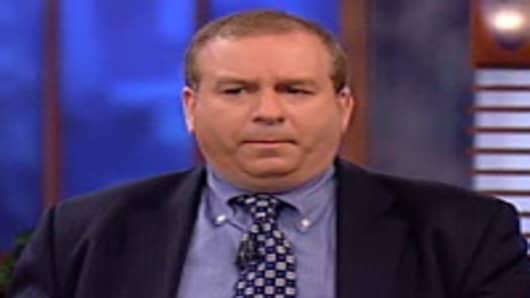Economic growth is far slower than it would be in a normal recovery, despite "gobs of stimulus" from the government and U.S. Federal Reserve, economist David Rosenberg told CNBC.
With gross domestic productgrowth in the U.S. at just 1.5 percent and Europe and China slowing considerably, investors need to understand that this is no normal recovery from a recession that technically ended three years ago, said Rosenberg, chief economist and strategist at Gluskin Sheff in Toronto.
"The overall story is that with the massive intervention by the U.S. government and the Federal Reserve, they did manage to terminate the Great Recession in the mid part of 2009," he told "Squawk Box." "But the reality is that we never had much of a recovery, at least in the economy. And in terms of what we're seeing going forward, I still think that there's more downside risk than upside potential."
The stock market, though, has been growing at a steady clip, with the Standard & Poor's 500 posting an 11.5 percent price gain thus far in 2012.
But Rosenberg said equity prices have become almost completely dependent on loose Fed monetary policy and asset purchases known as quantitative easing. It's gotten to the point, he said, where the market actually cheers bad news, such as Thursday's data showing China's economy slowing considerably. (Related: China’s Slowdown Is So Bad, the Market Is Cheering.)
"We're back to the situation where for the stock market bad news is good news, because the good news is that we're going to get more gobs of stimulus to push asset prices higher at least over the near term," he said. "That's a driving factor behind this recovery that we've seen in the stock markets globally in the past month or so."
But that likely masks a broadening economic slowdown undeterred by a Fed balance sheet currently at $2.83 trillion.
"The Fed took rates to zero, then they tripled the size of their balance sheet. We had unprecedented fiscal stimulus for a peacetime economy," Rosenberg said. "If this was a normal cycle, we'd be averaging 8 percent GDP growth this cycle. We barely averaged more than 2, and a lot of that was just inventory reinvestment."
What investors need to remember, he said, is this recovery will be slower than a normal manufacturing slowdown because it followed the popping of a credit bubble.
The subprime mortgage market collapsed in 2008 and Americans since then have been working on reducing debt and building cash, thus slowing down commercial activity.
Couple that with policy uncertainty in Washington over the possibility of tax increases and spending cuts hitting in 2013 — the "fiscal cliff" — and there's little hope for sustained economic gains, Rosenberg added. (Related: ‘Fiscal Cliff’ Looms Large as Congress Heads Off for Five-Week Vacation.)
"Here we go into three years of fiscal recovery and each of those three years we had double-dip scares, and that's not normal in the context of a plain-vanilla cycle," he said. "On top of that we have this fiscal bog that we're in right now creating a lot of uncertainty for the private sector."



